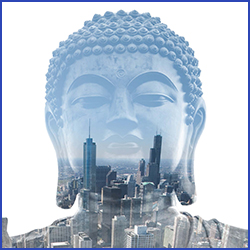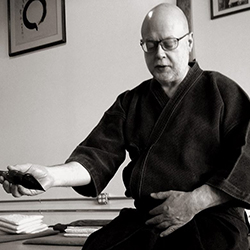2017

Why Buddhism and the Modern World Need Each Other
October 28, 2017
2:00pm - 4:00pm
Lincoln Park Student Center, Room 220
2250 N Sheffield Ave
The highest ideal of Western civilization (now globalized) has been to restructure our societies so that they are more socially just. The most important goal for Buddhism is to awaken and put an end to the dukkha (suffering) due to the delusion of a separate self. Today it has become obvious that we need both: not just because individual transformation and social transformation complement each other, but because each needs the other in order to be successful.
David Loy is a writer, professor and Zen teacher in the Sanbo Kyodan tradition of Japanese Zen Buddhism. A professor of Buddhist and comparative philosophy, Loy has a PhD from the National University of Singapore, and has been on the faculty at Bunkyo University, Japan, Xavier University in Cincinnati, and Naropa University in Boulder, and visiting professor or lecturer at many universities.
View poster for additional information.

Zen Ken Sho
October 31, 2017
6:00pm - 8:00pm
DePaul Theatre School, Rehearsal Room 442
2350 N Racine Ave
Edwin Tessin Brand, David So'zan Miller (dean of DePaul's Jarvis College of Computing and Digital Media) and Meido Moore give a lively presentation of swordplay and calligraphy in the Japanese Rinzai Zen tradition.
View poster for additional information.
Academic Year 2013-2014
The Center for Religion, Culture and Community hosted the frank discussion "Walk Like a Buddhist" by author and Shambhala Buddhist practitioner Lodro Rinzler on January 15, 2014. Among the questions addressed were "How can I be the person I want to be when my job is unfulfilling?", "Is it OK to be spiritual even if I am in a romantic relationship that is not exclusive?", and "Can I practice Buddhism and wear really cool hats?" Those in attendance learned how meditation can inform the details of daily life, such as going out with friends, disappointing dates and work-related stress, as well as how to apply meditation to realize goals producing societal change.
The Center for Religion, Culture and Community hosted a talk by Loren D. Lybarger on "Religion and Identity among Palestinians in Chicago" on February 3, 2014. Professor Lybarger presented the stories of three Palestinian Muslims living in Chicago's Palestinian immigrant community on the southwest side and in the southwest suburbs.
Each story exemplifies, ideal-typically, a particular trajectory that an individual has taken in negotiating being religious and national identity. One person grows up going to the mosque schools but ends up working in a community center started by Marxists and secular pan-Arab nationalists. A second individual grows up in the bosom of the secular-nationals it milieu but ends up working, at least temporarily, for the mosques and for a city-wide Islamic advocacy organization. A third individual grows up the son of a PLO ambassador but ends up embracing a transnational Islam through his interactions with black nationalist Muslims on city's south side. I end by raising question sabot what, in the light of these stories, being Muslim and being Palestinian might mean.
The Center for Religion, Culture and Community hosted this presentation by Rabbi Yoffie on April 28, 2014. Interreligious dialogue is vitally important, but most of the time, it just does not work. We are content to emphasize general principles – mutual understanding, tolerance, love of humankind – and the result is too often conversations filled with platitudes and clichés rather than meaningful discussion.
Committed to interreligious dialogue but skeptical about how it is usually conducted, Rabbi Yoffie deals with questions such as the following: What are the factors in their respective traditions that make it difficult for Christians and Jews to talk openly and honestly about their religious beliefs? What are the real issues that divide us as religious people? Should Israel be central to interreligious conversation and how should it be discussed? How do the writings and statements of Pope Francis create new possibilities for interreligious relations?
Rabbi Yoffie believes that interreligious dialogue can work and that it should not be restricted to the esoteric musings of professional theologians. He will suggest ways to make it more interesting, more worthwhile, more theologically serious, and also more challenging—for Jews and Christians alike.
Academic Year 2011-2012
During the first week of October 2011, the Center for Interreligious Engagement had the pleasure of hosting a group of Tibetan monks from the Drepung Gomang Monastery in India at DePaul. The monks were wrapping up a year-long tour across the United States, raising awareness about their monastery and the situation in Tibet as well as funds to support their life back in India.
Their time at DePaul was only one week of their three-week stay here in Chicago, where they participated in activities across the city. Part of how they raised funds for their livelihood was sharing traditional Tibetan Buddhist practices with the greater community. Here at DePaul, the monks spent five days working on a Sand Mandala and an evening performing a Puja, or blessing.